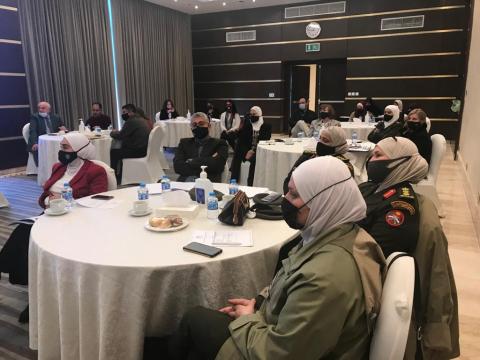

The Higher Population Council held the first meeting today Monday for the Directing Committee of the National Strategy for Reproductive and Sexual Health (2020-2030) with the participation of representatives of national partner parties. This because of the pivotal role the committee plays in following up with the stages of preparing, carrying out and assessing the strategy.
The meeting aimed at researching and approving the strategy’s final document which was prepared by the Higher Population Council with the contribution of all those involved from governmental and non-governmental organizations and civil and international society organizations which work with reproductive health and gender issues.
The Secretary General of the Council, Professor Abla Amawi, indicated that the strategy provides a frame of reference for different partners. It’s possible through to develop, align or incorporate corporate plans and necessary interventions to achieve full access to comprehensive reproductive and sexual health services and information to contribute to welfare of Jordanian families.
She also indicated that this strategy will contribute in achieving the goals of sustainable development of 2030, and especially the third goal concerned with health and welfare. The strategy will also strengthen the call for corporate, national and international resources assigned to fund operational plans specific to reproductive and sexual health issues.
The Head of the Programme Unit of the Higher Population Council, Professor Sawsan Dajah, indicated that strategy includes four hubs: (the enabling environment hub, the information and services hub, the society hub and the sustainability and government hub). The strategy also builds on evidence, data and the lessons learned from international, Arab and national reports and studies, and it takes into account the specific nature of the situation in Jordan relating to the priorities of reproductive and sexual health issues.
Dajah also drew attention to the fact that desk evaluations of studies, reports and strategies related to reproductive and sexual health on a national level have indicated that there are a number of challenges which face achieving the targets specific to reproductive and sexual health in Jordan. The most prominent of those challenges are exemplified by the limitation of the integration of reproductive and sexual health programs and primary health care programs, as well as the increased size of unmet needs of information and services and the vulnerability of reproductive and sexual health services provided to Syrian refugees. This is due to the financial, social, cultural and awareness barriers that hinder their access to these services, as well as a lack of services directed towards sexual health and sexually transmitted diseases and the health of adolescents and young people. This is also due to the absence of comprehensive reproductive and sexual health services (medical, mental, social and familial) and which makes the services available to all accommodating to diversity, involving groups that are most vulnerable to exclusion and discrimination like the disabled and gender violence victims. The coronavirus pandemic is one of the causes that increased the intensity of these challenges on both public and private sector levels.
The Head of the Population and Development Program at the United Nations Population Fund, Layali Abu Sair, confirmed on her part the importance of ensuring the provision of reproductive health services to be based on age and gender, as reproductive health should be taken into consideration from the pre-pubertal phase until the reach of menopause. She also indicated the necessity of working on carrying out the recommendations and commitments made by Jordan in International Conventions such as the Nairobi Convention in 2019.







